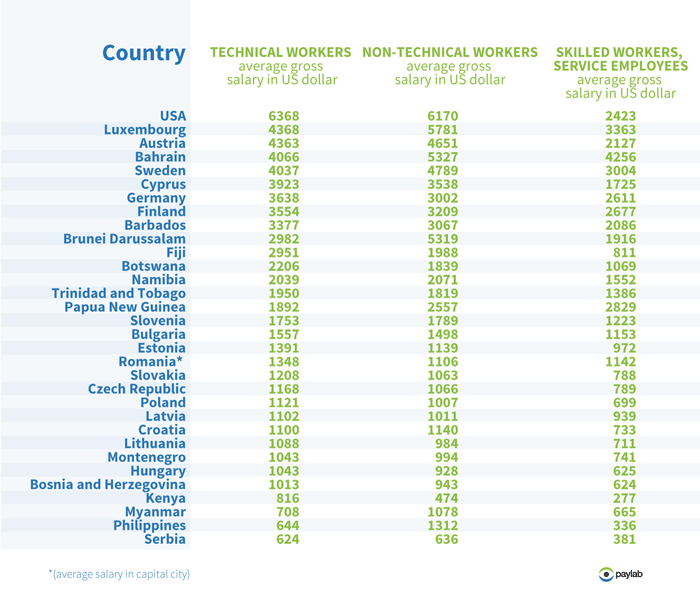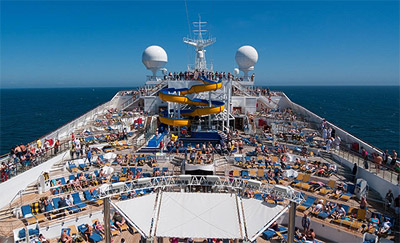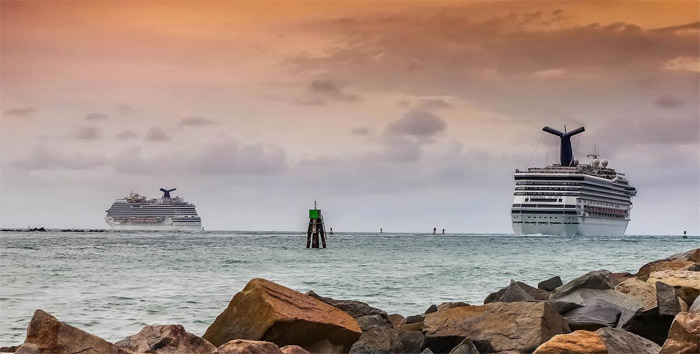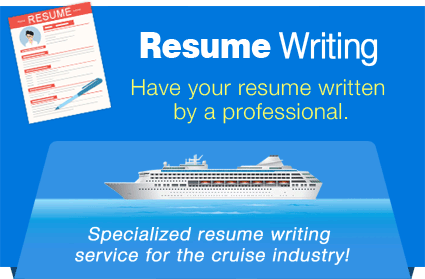Welcome on board as an employee! How much can you earn?
Cruise ships offer many working opportunities that can be done on dry land as well as at sea on a 'special touristic floating city'.
Most cruise ship job ads however, don't mention salaries, so the question you need to ask yourself is - how much do cruise ship jobs pay? When compared to potential wages you can earn on-land – does it compare or even compete?
Co-operating with international salary-portal Paylab we took a detailed look at these salaries.

Motivation versus Salary
During work time, employees - alongside passengers - will get to sail and visit new, interesting and exciting destinations, which under normal circumstances they wouldn't be able to. However, despite these exciting locations, as employees, they will have very limited opportunity to move or spend their free time in these places (during their 5-6 month contract), as crews are governed by strict safety and desk rules within a clear hierarchy.
Nevertheless, working on cruise ships is an attractive opportunity to explore different continents and as a result, is a hard job to get.
For instance, agreeing to an half-year contract is a big commitment. Applicants need to have a clear picture of their motivation, but more importantly need to ask themselves – do I want to go and work on a cruise ship because of the traveling, experience and adventure it will give me, or do I want this job because of the money?
If you are an applicant from the USA, Australia, UK or Germany; your salary probably won't be that enticing given the living costs in your homeland. However, if you are from Latin America, India, Central or Eastern Europe etc., this is something different. Generally, how attractive cruise ship salaries are is dependent on the country, environment and circumstances from which applicants come from.
Basic salaries for staff and crew are usually clearly defined by the employer's company - regardless of employee nationality – and are judged based on their skills, language capabilities and qualifications. However, for certain positions, cruise ships prefer to employ applicants from countries with which they have strong background experience.
Paylab.com compiled an overview of the average salary within selected countries according to their position level. The differences between salaries in applicant's homeland countries is quite obvious, and as such will provide greater motivation for people to look for a job on cruise ships, as in most instances they will get a better salary.

Compare your salary with others
How are certain positions on cruise ships paid?
On cruise ships there are different levels of working positions, ranging from support staff to management. In principle, if you conduct yourself well, your career progression is likely to move much faster than it would do on land. The motivation is that - with each new contract you will aim to get a higher position. A move that is made much easier if, for example, your language levels are high. This will give you an advantage above other applicants.
From a numbers point of view - most job positions are offered within the Food and Beverages area. The salary here depends on whether an employee is in direct contact with clients, working for example as a waiter, busboy/assistant waiter, bar waiter/waitress, bartender, or cocktail waitress. Individuals in these posts will have a very low basic salary, but will have the opportunity to earn lots more through tips.
There is a rule: the more a tourist stays on board, the more money you will make.
Before the cruise commences, tourists are made aware of a recommended amount of money they should give as tips per job position. However, even in these circumstances, it is important to remember that there will be times where there are tourists who are not pleased about the idea of paying tips, so won't. This means you need to pay greater attention to your base salary, so you are aware of the 'worst case scenario' in your monthly earnings.
Tipping positions for example have a small base salary of approximately 200 dollars plus tips. Approximate sample earnings in this group are (in U.S. Dollars per months):
Waiter from $2500 to $4000
Busboy /assistant waiter from $1500 to 3000
Bar waiter / waitress from $1000 to $2500
Bartender from $1500 to $3000
Based on this information, you should be more interested in working in a position that doesn't include direct contact with clients. Whilst these offer only a basic salary (with no tips); non-tipping personnel (who usually serve the crew, i.e. the lower positions in the passenger area – staff waiter/waitress, snack steward, etc.) are given a fixed salary, with earnings ranging from 1750 to 2500 USD per month.

This may not sound like a lot in comparison to the potential earnings tips can add; however there are a lot of other areas where it is possible to earn a higher fixed based salary. These include: Accommodation, Beauty and Wellness, Casino, Entertainment, IT jobs, Retail jobs, Sport and Fitness, Office jobs, Marketing, Medical jobs, Management jobs, Shore excursion jobs, deck and Engine jobs, Photography jobs and so on. Not only do they offer a higher fixed salary, but there is room for negotiation during an interview.
For some specialized technical and managerial positions - where high qualifications, training and experience is required - there is even greater room for negotiation.
Pluses and Minuses that you must consider
Before applying for any job it is important to consider the pros and cons.
Minuses: there is little privacy and lots of work.
Given the limited amount of space available on boats, employees will have to adapt to working and living in confined spaces. For example, they will have private cabins and employee spaces that they'll have to share with other colleagues. Similarly, shifts are long lasting from 12 to 14 hours a day, 7 days a week, with holidays each month that can be counted out on just one hand. More importantly, you will be separated from your family and friends for months at a time.
Compare your salary with others
Positives: you can expect to earn better salaries on board a cruise ship, compared to what you could earn working on land in your homeland.
Space might be limited, but you can benefit from minimal livings costs (during the contract), because all of your living, food and uniforms are free. Also, there are no commute expenses – as you are already at work. In fact, you will be given the chance to travel around the world and see lots of interesting places without the cost of travelling.
In addition, depending on where you are from (your homeland), you may not even need to pay taxes for your income.
A young Slovakian woman Dada, who has a lot of experience with working at Carnival Cruise Lines evaluates her working experience as follows: "It was hard work but I don't regret anything. I have seen many beautiful places which I would not have otherwise, and basically for free, because it was during my contract. Places such as Caribbean, Bermuda's, Bahamas, middle America, Mexico, Alaska, Hawaii, plus US homeports. And nobody can take these memories away from me. And about my salary... Sometimes it was ok, sometimes not... It depended on guests. Those better-behaved and solvent were of course from the US west coast, sailing from LA and San Diego, as well as those from Alaska and New York had a higher level, but the clientele was more difficult."

The popularity of cruise travel is rising. According to the Cruise Travel Report which was released by Cruise Lines International Association (CLIA), cruise travel has become the most popular travel preference amongst younger generations, including Millennials, creating a new "Cruise Generation."



